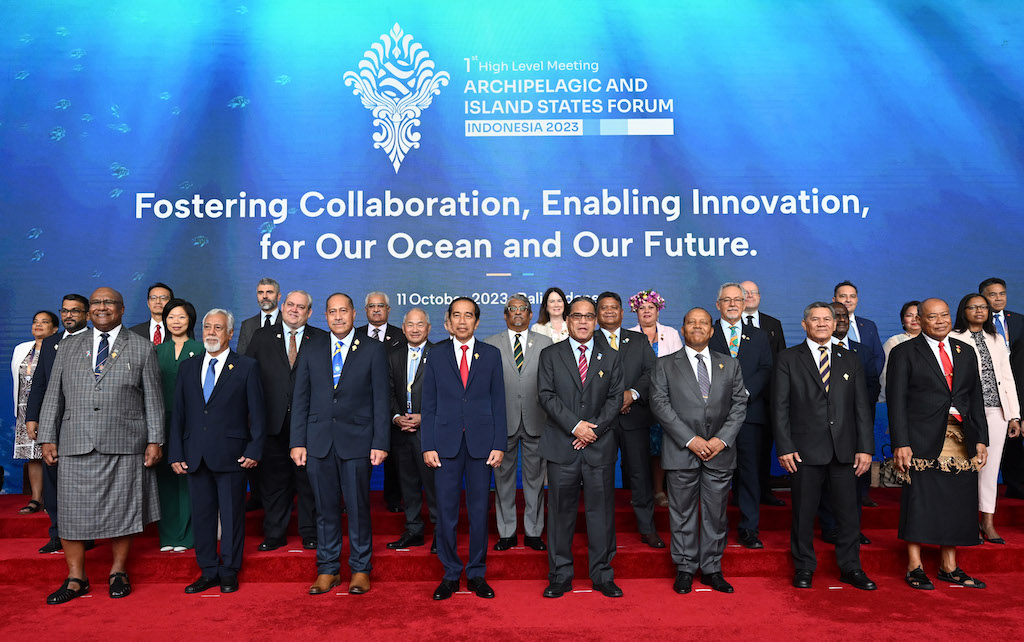Archipelago states together to tackle climate change
Five years after the Manado Declaration, the Forum of Archipelagic and Island States (AIS), which brings together 51 countries from around the world, is being strengthened. Gathered in Indonesia - the country with the largest number of islands - they relaunched their commitment to increase solidarity and cooperation on major challenges such as combating ocean pollution, sustainability in fisheries and tourism, and emergency management.
Bali (AsiaNews) - 32 countries have signed the declaration of the Forum of Archipelagic and Island States (AIS) in Nusa Dua, on the island of Bali in Indonesia on Wednesday 10 October. The declaration includes a commitment to increase solidarity and cooperation in addressing the threats of climate change, including sea level rise.
Indonesia is the largest archipelagic nation in the world, made up of five main islands and around 30 smaller archipelagos, for a total of around 18,110 islets of which around 6,000 are inhabited.
For this reason, the South-East Asian country was also the most natural choice to host this crucial event for the nascent international organization AIS established with the Manado Joint Declaration in 2018, again in Indonesia, in the province of North Sulawesi. To date, the AIS Forum consists of 51 island and insular countries, including Japan and England.
AIS Forum is a platform designed to include 51 archipelagic states and high-island countries from around the world to jointly address the challenges of using ocean resources for sustainable economic growth, resilience to climate change, ocean pollution, emergency management and improved sustainable fishing.
“The ocean is a source of life and for Indonesia it is not a 'divisive' element, but a 'glue' and a connector. Through the AIS Forum, our country invites all countries that like ours have many kilometers of coasts and sea, to collaboration and cooperation", said Indonesian President Joko Widodo during the first session of the AIS Forum meetings.
Widodo also explained that the threats faced by island and archipelagic countries are very real and common to all, such as “rising sea levels, ocean pollution caused by waste and debris, which not only threaten the sustainability of life on land and sea, but also sovereignty and territorial integrity".
In addition to strengthening solidarity between states with common geographical characteristics, AIS member countries also want to ensure that economic development continues despite difficult challenges.
“Island and coastal countries, regardless of location, size and level of development, face the same environmental and development challenges, but at different levels, which must be resolved through joint efforts and real collaboration,” reads the statement issued by the international organization at the end of the work.
Also speaking during the proceedings was the chancellor of the Agricultural Institute of Bogor, Arif Satria, who illustrated the economic potential of the oceans when combined with the principles of sustainable and environmentally friendly development and gave the example of portable FADs - floating structures that create the ideal conditions to attract marine organisms (fish, molluscs, etc.) and therefore used as a fishing tool - which are now starting to be introduced to fishermen in Madagascar. “It's easy, cheap and can be taken anywhere.”
“First we must act to mitigate the serious challenges of climate change and how we, the archipelagic nations, should adapt to these new but serious environmental challenges,” explained Retno Marsudi, Indonesia's Foreign Minister. She added: “Secondly, we must work together to develop international collaboration to create a sustainable economy and encourage ecotourism. Third, we need to seriously address marine litter and clean our coastal areas of any plastic debris. Finally, we are morally challenged to have clean maritime management and good maritime governance."
In the closing speech, the president of the host country also mentioned the concept of "blue economy" - an economic model dedicated to the creation of a sustainable economic system through technological innovation - supported by Indonesia to be implemented in island countries and archipelagic: “The potential of the blue economy is very large and must be explored and used to become a pillar of growth and well-being for people. The sea is a source of life, sustainability and justice", concluded Widodo.
11/02/2022 15:38
04/11/2021 09:58








.png)










